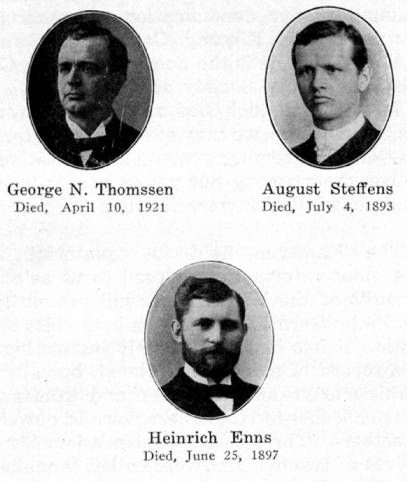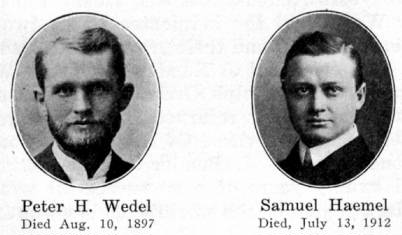Chapter VIII
Foreign Missions
"Ye shall be my witnesses .... unto the utter-most part of the earth." Acts 1:8.
Our historical outline would be incomplete did it not make mention of the men and women, brought up in our German churches, who, under the urge of God's spirit, went to the "regions beyond" to serve their Lord there. Our list of these noble workers unhappily must be incomplete, especially in the ease of many young women who went out under the direction of the Women's American Baptist Foreign Missionary Society, for in many cases these women missionaries transferred their church letters to English speaking churches and thereby lost connection with our general work.

1. The Telugu field in South India became a household name in our home and church circles since the early eighties when George N. Thomssen and his wife became the first of a notable band of brothers and sisters who labored in that field. The Thomssens spent 84 years in that part of India, in Vinukonda, Kurnool and Bapatla, and served successfully with such distinction that Brother Thomssen was decorated by the British government in 1915 for meritorious public service. Brother Thomssen died in Cincinnati, O., in 1921.
Then followed Jacob Heinrichs and his wife in 1889, who had completed 28 years of service at Nellore, Ongole, Vinukonda and Ramapatnam--at the latter place as President of the Telugu Baptist Seminary for 22 years--when he came back to America in 1917. He is at present professor of Dogmatic Theology in the Northern Baptist Seminary at Chicago, Ill.

The talented and lamented Samuel Haemel went out in 1907 with his wife to the same field, but his time of service was cut short by his unlooked for death, after three years of promising endeavor.
2. The Kachin field became known to our churches through the labors of George Geis and his wife who went to Upper Burma in 1892, where they had spent 24 years of most successful service, when the World War necessitated a change of fields. They were transferred to the Philippine Islands in 1918 and, after laboring there for four years, returned to their "first love" in Myitkyina, among the hil1 tribes of Upper Burma.
3. George H. Kampfer and his wife went to Gauhati, Assam, in 1910, to which field he has lately returned, after a furlough of five years spent with the German Baptist church in New Hamburg, Ontario.
4. China has had our first representatives in the persons of Jacob Speicher and his wife, who, going out in 1895, have made an honorable and very successful record for themselves in the missionary annals of our denomination. Brother Speicher's fields were Kityang, Canton and Swatow, and, since 1913, he is the Secretary of the China Baptist Publication Society at Swatow
5. In 1919 Emanuel Gied and his wife went to China from whom we may surely expect to hear great things in coming years. The latest representatives from among our young people to go to India as missionaries were Herman Sorg and his wife.
6. The Kamerun field in equatorial West Africa, now unfortunately closed to us as one of the results of the World War, will not easily be forgotten by German Baptists on both sides of the Atlantic. It has had an intensely interesting history, a record of great achievement, but also one of heroic martyrdom. The men and women who left our churches to labor there were of our choicest members. Three of the first missionaries and the wives of two of them were called to make the supreme sacrifice, each after a service of but one or two years: August Steffens, Henry Enns and Peter Wedel and the helpmates of the two first mentioned have found their graves in African soil.
E.R. Suevern, Carl I. Bender, Valentine Wolff, Benjamin Graf, Adolph Orthner and Herman P. Kayser have safely returned after a longer or shorter term of service. Of this heroic group of missionaries, Carl J. Bender was permitted to spend twenty years of most successful work in this dark region of the world's darkest continent.
We are hoping that the time may speedily come when our German churches will again have the opportunity of sending forth some of their own forces to a foreign field under their own direction. Supporting European missions cannot call forth that missionary enthusiasm among the younger generation in our churches that is so necessary for the continued growth of the missionary spirit.